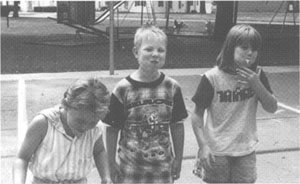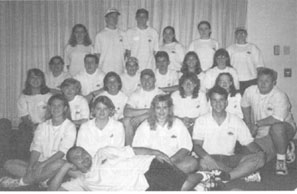

Photo at left: Youth from an Illinois small town break into laughter during a special event corrdinated by the rural recreation program.Right: Recreation Directors and Youth Recreation Leaders for the 1997 program gather for a group photo.
PARTNERSHIPS
PARK DISTRICTS, FOREST PRESERVES AND RECREATION DEPARTMENTS
WORKING TOGETHER WITH CIVIC AND BUSINESS LEADERS TO BUILD OUR COMMUNITIES
Small-town America
Needs Recreation, Too
Many partners provide recreation in rural Illinois communities
BY JIM BRADEMAS, PH.D.
The Illinois Rural Recreation Development Project (IRRDP) enters its fourth year of operation in the summer of 1998. The project is designed to introduce summer recreation activities in small rural towns that do not have recreation programs. Programming was done in five cities in 1995, six in 1996 and seven in 1997. This summer will see programming in five communities.
Activities are offered for children ages 6 to 13 on Monday, Wednesday and Friday mornings from 9:00 a.m. until noon. The program is noncompetitive in nature and offers arts and crafts, sports and games, and creative problem solving. Afternoons are scheduled for older children for field trips to out-of-town swimming pools, baseball games and theme parks. Evenings may be scheduled for potlucks and dances.
Professional Leadership
The programs are directed by Recreation Directors and Youth Recreation Leaders. Recreation Directors are leisure studies senior or recent graduates from the various departments of leisure studies in Illinois. Recreation Directors are required to move to their cities and live there for a period of eleven weeks. Without question, it is the professionalism of the Recreation Directors that has contributed to the success of the program. Youth Recreation Leaders are teenagers who have been recruited from each city and who are trained on the campus of the University of Illinois. A number of these young people have expressed an interest in pursuing recreation as a career.
Citizen's Recreation Advisory Committees
Each city is required to form a Citizen's Recreation Advisory Committee. The function of this committee is to monitor the progress of the program and advise the Recreation Director on the availability of local facilities, civic clubs, current programs and volunteers. One member of the committee is charged with the responsibility of monitoring all expenditures.
Over the past three summers, a total of 107 different individuals have served on the citizen's committees. The makeup of the committees includes bankers, teachers, insurance agents, ministers, secretaries, social workers, homemakers, travel agents, salespeople, coaches, school principals, farmers, newspaper editors, reporters and others.
Local Partnerships
The diversity of partnerships generated through the rural recreation program truly has been impressive in every small community. More than 100 different civic clubs, agencies, businesses and public departments such as police, fire, street and water, and individuals have contributed time, money, services and products to the program.
How Partnerships Are Formed
Each community prepares a Recreation Assessment prior to the beginning of the program, which includes the following:
• Community Background: Contact information for city council members; members of the Citizens Recreation Advisory Committee; potential volunteers and their skills related to the program; media serving the city; community organizations, associations and committees that might help the program.
• Recreation Facility and Program Inventory: This section lists the recreation facilities available including community buildings, passive outdoor areas, active recreation areas, special natural and historical sites, and man-made attractions. Also listed are any recreation activities or programs already in existence such
12/ Illinois Parks and Recreation
SMALL-TOWN AMERICA NEEDS RECREATION, TOO
as summer library and church programs, sports, fitness programs including Little League and swimming lessons, hobbies and nature and other outdoor programs, special events including 4th of July celebrations, festivals and county fairs. It is not the intention of the rural recreation program to duplicate any existing programs. Indeed, our directors have been asked to lend their expertise in assisting in these local activities.
• Community Recreation Needs and Interests: A statement of the community's recreation needs and interests.
This assessment is shared with the Recreation Director. Recreation Directors study the assessment before moving to their towns where they spend nine days before the program begins. During this period, the director becomes familiar with the total environment of the community and begins to bond with the three Youth Recreation Leaders who have been selected by the citizen's committee to assist the director during the summer. At the conclusion of this period, the youth leaders come to the campus of the University of Illinois for four days of training, which is led by the Recreation Directors.
 |
Photo at left: Youth from an Illinois small town break into laughter during a special event corrdinated by the rural recreation program.Right: Recreation Directors and Youth Recreation Leaders for the 1997 program gather for a group photo. |
External Partnerships
External funding of the IRRDP is critical to its success. The cities range in population from 980 to 4,400 and do not have sufficient resources to fund the entire program. Each city makes a modest cash contribution and provides housing for the Recreation Director. External partnerships for funding have been made with a number of different entities. Over the four summers, funding has been received from the following: W.K. Kellogg Foundation, University of Illinois Provost, Illinois Department of Natural Resources, Governor's Rural Affairs Council, the Cooperative Extension Service, College of Applied Life Studies, Carle Center for Rural Health and Safety, Illinois Association of Park Districts, Illinois Park and Recreation Foundation, and the AT&T Corporation. A new partner for the '98 program is the Illinois Arts Council which will provide funding for several artists to travel to the cities for special programming in storytelling, music and puppetry.
Why the Partnerships Work
Virtually everything related to the rural recreation program is based on partnerships built on mutual trust, respect and, most of all, on performance. The concepts of trust and respect on the part of city councils, which must approve the program by formal vote, residents, businesses, civic clubs, and foundations is due primarily to the prestige of the University of Illinois and its reputation throughout the state. While the Department of Leisure Studies may not be well known, the university itself is well accepted. These entities accept the presentation made on the rural recreation program because they know the university and that one of its departments is the sponsor.
Among the many testimonials received about the program from partners, perhaps the most eloquent was the following from Mayor Rex Peterson of Momence, Ill., to project director Dr. Jim Brademas:
"I wanted to personally write and tell you that our Recreation Director has been an outstanding addition to our community. She has been well received by our residents, parents and children. Her organization skills are exceptional and her enthusiasm is contagious. She has published a newsletter and brought the program to the attention of the public in virtually any way you can think of. She has appeared and made reports to the city council that were informative and very professional.... The fact that the University of Illinois has programs that teach young people like her to perform so well, speaks highly of you and your program. "
It is the conduct of the program and the performance of the Recreation Directors and Youth Recreation Leaders that establishes the project for the future in every city in which we have programmed.
The Future
A consortium of the eight universities in Illinois that offer recreation curricula has been formed to expand the project statewide. The basic idea is to have all eight universities program in small towns in their respective geographical areas. A project of such magnitude depends on substantial external funding. While efforts are being made to secure funding, the future of the project remains in doubt. •
 |
JIM BRADEMAS, PH.D. |
May/June 1998/ 13